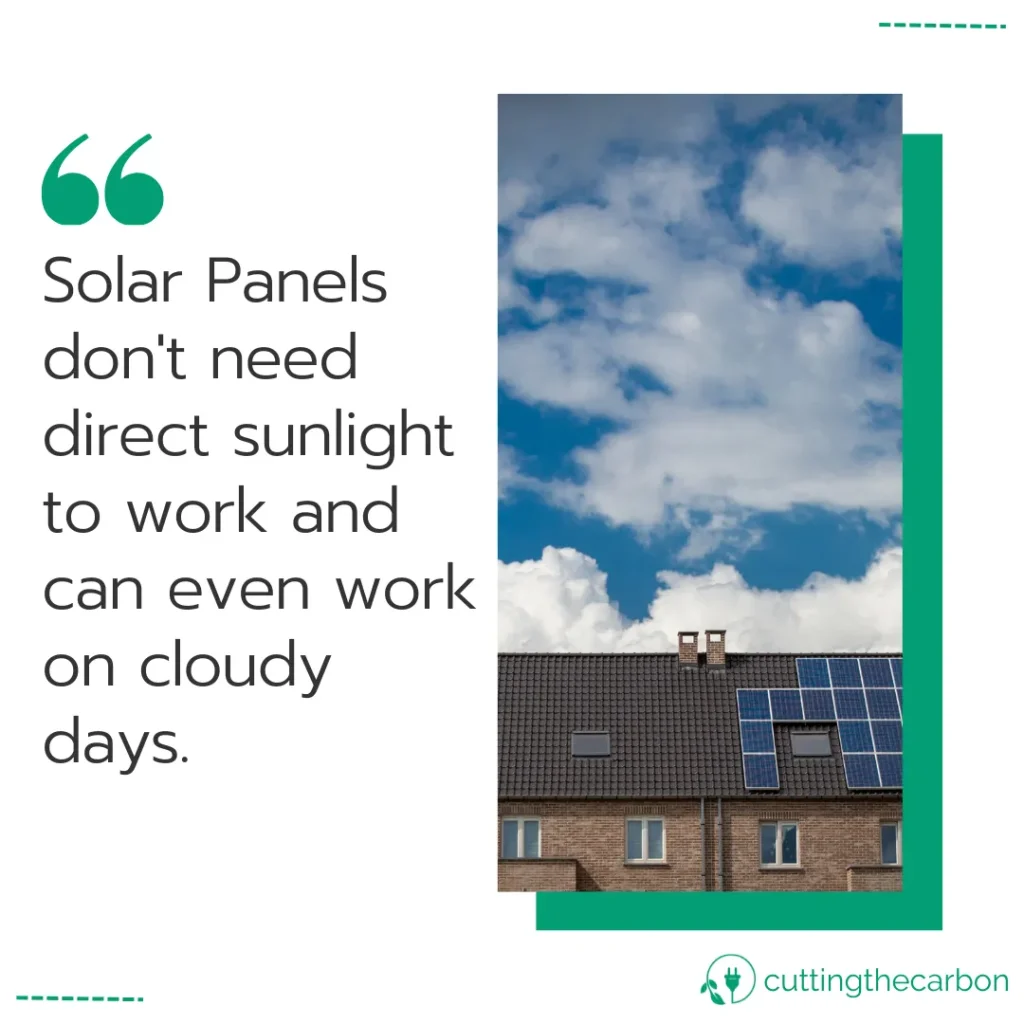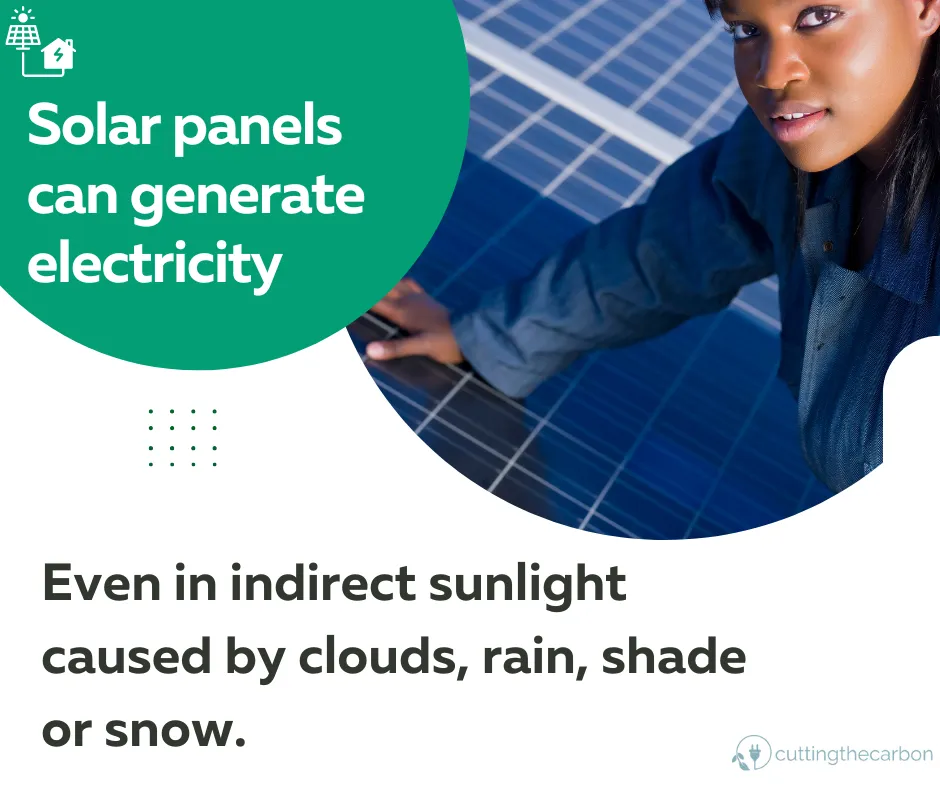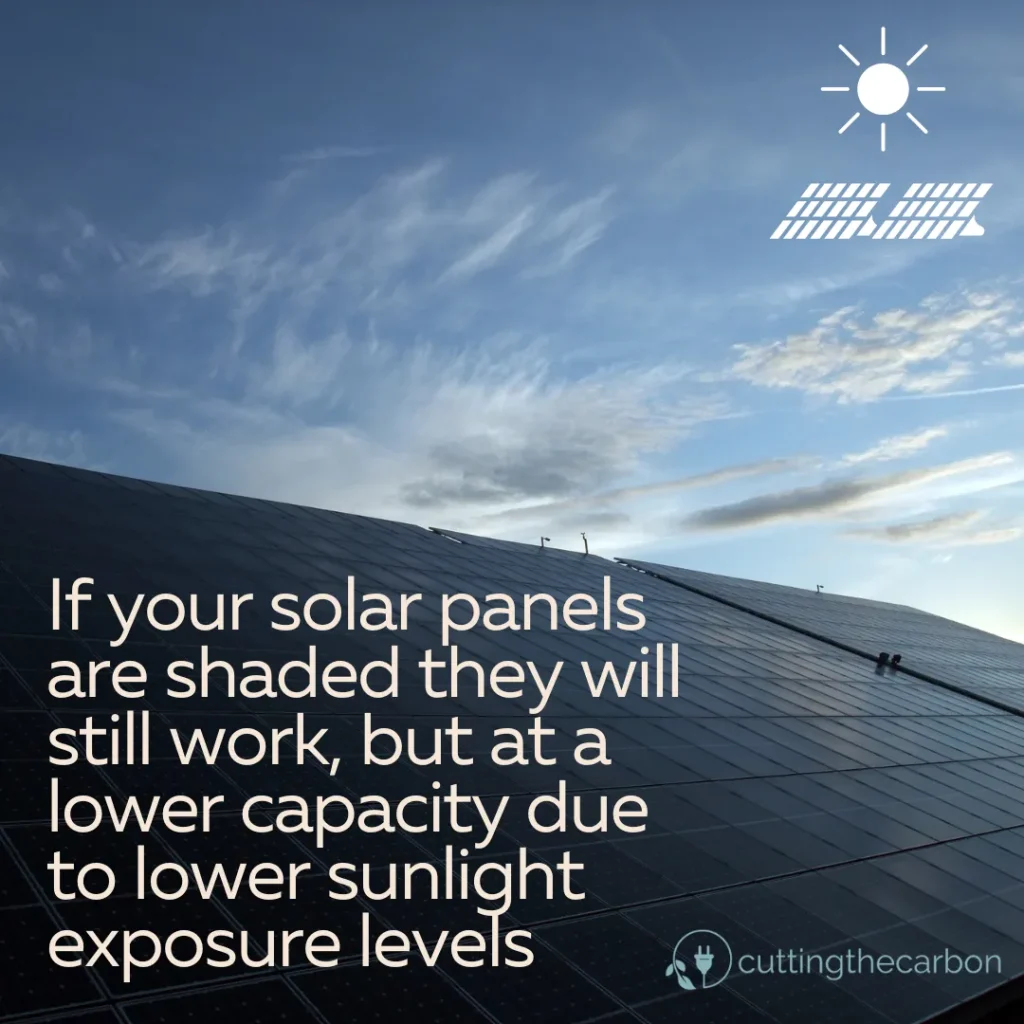Do solar panels need direct sunlight to function effectively?
This is a common query that many people ponder when thinking about transitioning to renewable energy.
Contrary to popular belief, solar panels don’t necessarily require direct sunlight to generate electricity. But what does this mean for their efficiency and your potential savings?
The Science Behind Solar Panels and Sunlight
Realising how solar panels operate can seem daunting, yet it’s easier than expected. Solar cells within the panels are configured to convert sunlight into electricity that we can use.
Solar cells within these panels are made of semiconductors, typically silicon-based materials layered with phosphorus and boron, creating an electric field across them.
When sunlight hits these cells, electrons get energised and pushed out of their atoms as they flow through this electric field, generating electricity.

The Role of Visible Light in Electricity Production
You may be wondering about visible light’s role in this. Solar panel systems utilise direct and indirect sunlight to produce power – even on cloudy days or during partial shade conditions when only diffused radiation reaches us due to cloud cover blocking some rays.
This means your installed system will still output some electricity regardless of whether clouds are present – although admittedly at lower levels compared with clear sky conditions.
So yes, while very sunny days give maximum output by receiving more of the sun’s brightest rays and UV radiation, less optimal weather doesn’t mean zero production.
Optimal Positioning for Solar Panels in the UK
Solar panels and sunlight are an inseparable duo. But did you know their relationship goes beyond just basking under direct rays? The positioning of your solar panels plays a significant role, especially here in the United Kingdom.
South-facing solar panels aren’t merely preferred; they’re practically essential to maximise efficiency. As we all know, our sun dances from east to west across a southern arc throughout the day, making south-oriented installations ideal for soaking up those precious photons.
The Role of East and West-Facing Installations
If south-facing isn’t feasible due to property constraints or other factors like shade levels, don’t worry. You still have options, namely, east-facing and west-facing setups.
These configurations may not hit peak production at high noon as their southerly siblings do but can generate power over extended periods during mornings (for eastern orientation) or evenings (if facing west).
This flexibility is one reason why it’s crucial never to dismiss installing solar technology simply because your roof doesn’t face directly towards Spain!

Overcoming Challenges with Shade Levels
You might be thinking now – what about shade? This poses challenges by reducing direct sunlight absorption and indirect light reflection off clouds or nearby surfaces on your panel array.
To tackle this issue head-on before installation even begins, consider conducting shading analysis – a service any professional installer such as Octopus Energy should offer as part of their quote process.
This assessment gauges potential obstructions’ impact at different times across various seasons, ensuring optimal placement despite environmental hurdles.
In cases where shade proves unavoidable, technologies such as micro-inverters or power optimisers could come into play, allowing each panel within an array to operate independently so shaded cells won’t drag down overall system performance, improving energy yield significantly.
Solar panels in the UK don’t just need sunlight; they need optimal positioning. South-facing installations are best, but east or west can work too if south isn’t an option. Don’t let shade put you off – professional installers have solutions to maximise efficiency despite environmental challenges.
Impact of Weather Conditions on Solar Panel Performance
The effectiveness of solar panels is not immune to the whims of Mother Nature. Weather conditions can significantly influence how much electricity your solar panels produce.
Harnessing the Sun’s Energy Even During Cloudy Days
Solar power isn’t just about direct sunlight. It’s also about indirect sunlight that reaches us even when the skies are overcast or it’s a cloudy day in the UK. The technology inside solar panels allows them to absorb and convert this diffused light into usable energy.
This phenomenon, known as diffuse light, occurs when clouds scatter the sun’s rays in different directions rather than focusing them directly onto your installed solar panel system.
This means that while efficiency may decrease slightly due to the reduced intensity of UV radiation reaching the surface, these south-facing panels aren’t left idle – they continue generating electricity, albeit at a slower pace.
Thin-film techs like a-Si and certain OPVs can be more effective when light is diffused rather than when it’s full sun exposure.
So yes, super sunny days might be ideal for traditional PV systems, but rest assured, knowing that you can still draw upon a valuable renewable energy source even during less favourable weather scenarios like partial shade levels or cloud coverage.
Do Solar Panels Need Direct Sunlight To Work Video
Maximising Efficiency from Your Solar Panels
Solar panels, a brilliant innovation in green technology solutions, effectively harness the sun’s energy. But how can you ensure your solar panels work at their peak efficiency? It all boils down to understanding sunlight intensity and maintaining your system.
Why Sunny Days Are Best
The magic of solar power works most effectively on super sunny days when more of the sun’s brightest rays and UV radiation hit the surface of your installed solar panel system.
The increase in light intensity leads to a higher electricity output as it stimulates more photons within the photovoltaic cells inside these marvels of renewable energy tech.
However, this doesn’t mean you’re out of luck in less-than-perfect weather conditions, wintery or cold weather.
Even without constant access to full sunshine or during cloudy periods where indirect sunlight is prevalent, there are ways for homeowners like yourself to still generate electricity efficiently through proper maintenance practices. We also wrote a helpful guide discussing whether solar panels should be left on at night.
Maintenance Matters Too
Beyond positioning for optimal exposure towards a south-facing direction (or east/west if south-facing isn’t possible), regular cleaning routines also impact overall productivity levels.
Dirt accumulation over time may block some visible light entering the photovoltaic cells and reduce potential production rates even under ideal circumstances. This can be one of the reasons your solar panels are not working properly.
Please consider the following:
- A simple hose-down every few months should suffice unless located in particularly dusty areas requiring frequent attention.
- If accessing roof-mounted installations, remember safety first.
- Regular checks for issues such as shade or dirt covering parts also improve efficiency by ensuring nothing hinders absorption.

Longevity and Maintenance of Solar Panels
Solar panels, a vital part of capturing solar energy, are designed for long-term use. PV systems can be operational for twenty years or more, with routine upkeep required.
However, there’s an important caveat: certain elements, like inverters, might need replacement within this time frame.
Importance of Regular Cleaning
Cleaning is crucial when it comes to maintaining the efficiency of your solar panels over their lifetime. Dust particles on the surface may block some sunlight from reaching the cells inside, which could reduce electricity generation.
Regular cleaning becomes even more essential in areas prone to dust exposure or bird droppings. Rainfall naturally cleans those tilted at least 15 degrees.
However, manual intervention might be necessary periodically, especially if you live in regions with less frequent rainfall or have ground-mounted panels that attract more dirt due to proximity to earth surfaces.
Making an Informed Decision About Solar Power
Considering the impact of sunlight on PV systems, it’s important to understand how their performance is affected by direct and indirect light from the sun – even in partial shade. It’s vital to understand how sunlight influences the performance of solar panels.
The sun’s energy, whether it arrives as direct sunlight or indirect light on cloudy days and even during partial shade levels, is harnessed by these marvels of green technology to generate electricity.
In essence, while the brightest rays and UV radiation are ideal for maximum generation, less than perfect weather won’t halt your progress towards using renewable energy.
The Sunlight Spectrum: A Key Player in Energy Generation
If south-facing panels aren’t feasible due to building orientation or other factors, such as significant shade coverage from trees or neighbouring buildings – don’t despair.
West-facing and east-facing panels could be suitable alternatives, allowing sufficient access to the sun’s radiant gift.
Contact our knowledgeable team today
We know that every situation requires personalised advice based on specific needs. Whether residential or commercial purposes drive your interest in installing a PV system – we’re here with expertise through each step of the process.
- An understanding of positioning effects on efficiency levels,
- Awareness around maintenance requirements over time,
- And most importantly – make sure you save money on those energy bills while reducing carbon footprints wherever possible.
If expert advice explicitly tailored towards enhancing property efficiency using green tech solutions like solar power sounds appealing.
FAQs
Do solar panels work in the shade?
Solar panels can still function in the shade, albeit at a reduced efficiency. They harness both direct and indirect sunlight to generate electricity.
Do solar panels need to face the sun directly?
No, they don’t have to face the sun directly. However, positioning them towards the south ensures maximum exposure to sunlight for optimal performance in the UK.
What happens to solar panels when there is no sun?
In the absence of sunlight, solar panels’ power production drops but doesn’t cease entirely as it can use stored energy from previous sunny periods.
Conclusion
We’ve disproved the presumption that solar panels necessitate direct sunshine to operate. In fact, they work under various light conditions and even on cloudy days.
The science behind this is fascinating – it’s all about harnessing visible light for electricity production. Positioning matters and south-facing panels are ideal in the UK. But east or west-facing ones aren’t too shabby either!
We also learned how weather impacts performance but doesn’t halt power generation completely. Even during overcast skies, your solar investment keeps paying off.
Regular cleaning of your panels can enhance their efficiency further, while certain components might need replacing over time.
Ready to embrace green technology solutions that not only meet your needs but also help you save money on energy bills?
Cuttingthecarbon specialises in finding the right renewable energy options, including solar panels. Get in touch with us today. Let’s make your home more energy-efficient together.

